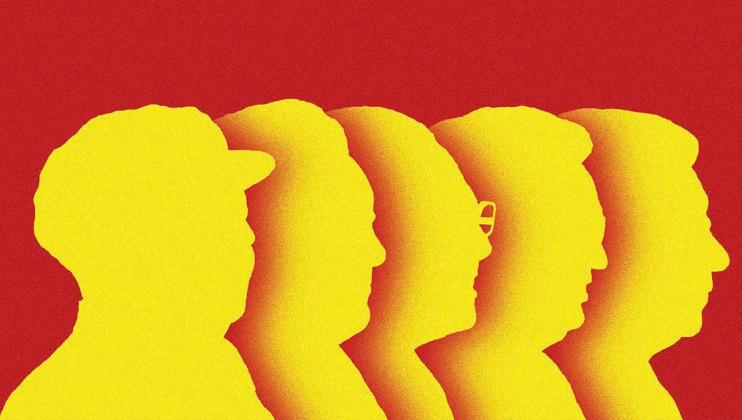From the bookshelf: David Shambaugh’s ‘China’s leaders: from Mao to now’
Posted By Robert Wihtol on November 25, 2021 @ 12:30

On 11 November, the central committee of the Chinese Communist Party adopted a ‘historical resolution’ [1] extoling party General Secretary Xi Jinping’s achievements. Similar resolutions have been adopted only twice before, for Mao Zedong and Deng Xiaoping. This one is widely seen as a prelude to the CCP congress that will be held this time next year to decide on the future of both China and its leader, Xi.
Under normal circumstances Xi, who turns 69 next year, would be retiring and the party congress would usher in a new leadership team. However, this will be no ordinary congress. In 2018, Xi engineered the removal of the constitutional term limit on the position of president, opening the way for him to be extended in all three of his leadership positions—president of China, general secretary of the CCP and chairman of the Central Military Commission.
The congress is expected to extend Xi for an unprecedented third 5-year term. However, there’s also speculation that Xi would like to be elevated to party chairman [2], a position held by Mao for 31 years and abolished by Deng in 1982. Xi’s path to a third term looks smooth, but behind the scenes there are suggestions that his opponents might have something different in mind.
David Shambaugh, director of the China policy program at George Washington University, has been analysing China’s leadership for the past 40 years. In China’s leaders [3], he expertly reviews the five men who have led China since 1949, taking it from abject poverty to its current status as the world’s second largest economy and a rapidly emerging superpower.
The five leaders are very different: Mao Zedong (who ruled from 1949 to 1976), the populist tyrant who led through chaos; Deng Xiaoping (1979–1989), the pragmatic Leninist who opened the economy; Jiang Zemin (1989–2002), the bureaucratic politician who made reforms a reality; Hu Jintao (2002–2012), the low-key technocrat whose term is often called ‘the lost decade’; and Xi Jinping (2012–), the modern-day emperor.
China’s recent past provides many lessons of relevance to the coming party congress. Shambaugh reminds us that for seven decades China’s leadership has been marked by in-fighting between factions. Mao’s push for continuing revolution was at odds with others in the leadership who wanted moderate change. Subsequently, regional factions, reformers and conservatives have vied for supremacy.
Leadership struggles are the norm. In 1971, Mao’s designated successor, Lin Biao, attempted a coup and died in a plane crash while fleeing the country. Mao’s succession involved a chaotic power struggle before Deng took over in 1979. Towards the end of the Deng era, two potential successors, Hu Yaobang and Zhao Ziyang, were ousted before the mantle shifted to Jiang Zemin.
Wisely, Deng anointed Hu Jintao in 1992 to succeed Jiang, a full decade in advance, which ensured a smooth succession in 2002. In 2007 the party congress once again witnessed a power struggle, between Xi and the heir apparent, Li Keqiang, from which Xi emerged triumphant. And Bo Xilai’s ouster in early 2012 cleared the way for Xi’s rise to power later in the year.
Xi’s policies are controversial. He is currently implementing a leftist revival with many of the trappings of the Mao era, from a personality cult that has put ‘Xi Jinping thought’ in the school curriculum to the introduction of ‘common prosperity’, a concept intended to shift wealth from the rich to the poor.
Xi has scrapped the political system crafted by Deng to avoid concentration of power, separate party and state, and ensure a smooth transition from one generation of leaders to the next. Instead, he has concentrated power with himself, put the CCP at the centre of everything, and muddied succession arrangements.
Shambaugh provides a timely reminder of the history of the position of party chairman. Following Mao’s death in 1976, the title was held briefly by Hua Guofeng and Deng’s protégé Hu Yaobang before being abolished in 1982 due to its close association with Mao’s dictatorship. In 2001, as his second full term was drawing to a close, Jiang attempted to resurrect the title for himself, a move that was firmly resisted by the party elders.
As the congress approaches, the political tension is building. Earlier this year, party watchdogs purged the police, secret police and judiciary, and regulators cracked down on large entrepreneurs. Many see the freshly adopted ‘historical resolution’ as a crucial step in elevating Xi to the party pantheon.
Not everyone is happy. Party leaders old enough to remember Mao’s tyranny are worried by Xi’s power grab, while younger leaders are frustrated by the lack of a clear succession. Normally, the next generation of leaders would have been identified five years ago and be getting ready to move up. If this party congress doesn’t put succession arrangements in place, due to age limits many may miss their chance altogether. They must be losing patience.
Shambaugh’s book is essential reading for anyone interested in the power play that is expected to unfold in Beijing over the coming year.
Article printed from The Strategist: https://aspistrategist.ru
URL to article: /from-the-bookshelf-david-shambaughs-chinas-leaders-from-mao-to-now/
URLs in this post:
[1] adopted a ‘historical resolution’: https://asia.nikkei.com/Politics/Chinese-Communist-Party-passes-resolution-on-history
[2] would like to be elevated to party chairman: https://www.ft.com/content/a320f178-2902-46e4-94ef-788ca8a06e9d
[3] China’s leaders: https://www.wiley.com/en-gb/China%27s+Leaders%3A+From+Mao+to+Now-p-9781509546527
Click here to print.